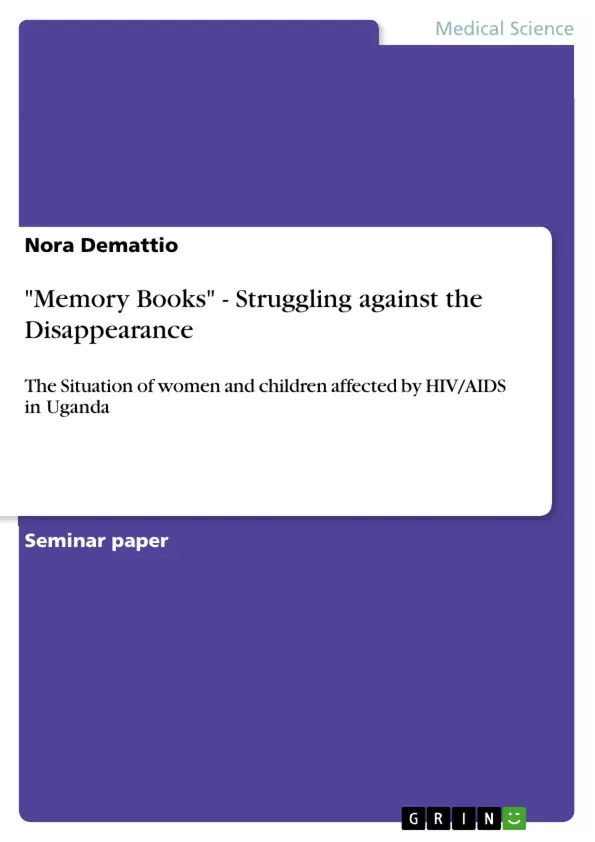It was the 1st of december 2008 at 9 o´clock p.m. when I turned on my television and switched to ARTE, to watch a documentary I had read about. It was called “Memory Books – Damit du mich nie vergisst”. I wanted to give it a try although I expected another depressing representation of “Africa” suffering from and dying of HIV/AIDS, as it has been almost common on the World AIDS Day.
It didn´t fulfill my expectations, in no way. I was touched, I was inspired and I wanted to know more about the situation of especially women and children affected by HIV/AIDS and the “Memory Project” of Uganda.
On the basis of this experience, in this paper I will have a closer look at Uganda, at the situation of parents, in particular of women living with HIV/AIDS on the one hand, and on the other hand at the situation of the children affected by the disease and who are left behind after the death of their parents.
First I will start with an overview of HIV/AIDS in Uganda.
Then I will provide an insight into the situation of women in Uganda in association with the epidemic, also concerning the law on domenstic and gender-based violence as on of the main reason for new and disproportionate infections of females, and the impact on children.
Furthermore I will introduce the “Memory Project” and its core, the “Memory Books”, which was started in Uganda through the national NGO NACWOLA (National Community of Women Living with HIV/AIDS), and point out the importance for both of them, parents and children.
The aim of my paper will be to reflect the situation of women and children considering HIV/AIDS, and to provide an insight into NACWOLAs “Memory Project” and its “Memory Books”. I want to overview the structure and to give a review on the goals of this program, as well as on its offered possibilities and maybe inherent difficulties.
Inhaltsverzeichnis (Table of Contents)
- Introduction
- Uganda
- HIV/AIDS in Uganda
- Uganda - Women and Children
- NACWOLA and the "Memory Books"
- NACWOLA and the "Memory Project"
- The "Memory Books"
- The "Memory Books" – Difficulties and Possibilities
- Conclusion
Zielsetzung und Themenschwerpunkte (Objectives and Key Themes)
This paper aims to examine the situation of women and children affected by HIV/AIDS in Uganda, focusing on the "Memory Project" initiated by NACWOLA (National Community of Women Living with HIV/AIDS). It will analyze the structure, goals, possibilities, and challenges of this program and its "Memory Books."
- The impact of HIV/AIDS on women and children in Uganda.
- The role of gender-based violence in the spread of HIV/AIDS among women.
- The effectiveness of past and present HIV/AIDS prevention strategies in Uganda.
- The NACWOLA "Memory Project" and its "Memory Books" as a response to the crisis.
- The potential benefits and challenges associated with the "Memory Books" initiative.
Zusammenfassung der Kapitel (Chapter Summaries)
Introduction: The paper introduces the "Memory Books" documentary and its inspiration for this study, outlining the focus on the situation of women and children affected by HIV/AIDS in Uganda and the NACWOLA "Memory Project".
Uganda: This chapter provides an overview of the history of HIV/AIDS in Uganda, including initial responses and the establishment of the AIDS Control Program and the Uganda AIDS Commission. It also addresses the situation of women and children in the context of the epidemic, focusing on the impact of domestic violence and the growing orphan crisis.
HIV/AIDS in Uganda: This section details the initial responses to the HIV/AIDS crisis in Uganda, highlighting the role of President Museveni and the evolution of governmental strategies. It also discusses the fluctuating prevalence rates and the shift in risk groups, particularly focusing on the challenges faced by women.
NACWOLA and the "Memory Books": This chapter introduces NACWOLA and its "Memory Project," emphasizing the central role of the "Memory Books" and exploring their importance for both parents and children affected by HIV/AIDS. It also points to an analysis of the program's structure, goals, potential benefits, and challenges.
Schlüsselwörter (Keywords)
HIV/AIDS, Uganda, women, children, gender-based violence, NACWOLA, Memory Project, Memory Books, orphans, vulnerable children, prevention strategies, domestic violence.
Frequently Asked Questions
What are "Memory Books" in the context of Uganda?
Memory Books are tools used by parents living with HIV/AIDS to document their family history and messages for their children before they pass away.
Which organization started the "Memory Project" in Uganda?
The project was initiated by the national NGO NACWOLA (National Community of Women Living with HIV/AIDS).
How does gender-based violence relate to HIV/AIDS in Uganda?
The study explores how domestic and gender-based violence are significant factors contributing to new and disproportionate HIV infections among women.
What is the situation of children affected by HIV/AIDS in this study?
The paper focuses on children who are left behind as orphans and the emotional and practical support provided to them through the Memory Project.
What are the goals of the NACWOLA program?
The program aims to provide possibilities for open communication about the disease, help families plan for the future, and preserve family identity.
- Arbeit zitieren
- BA Nora Demattio (Autor:in), 2009, "Memory Books" - Struggling against the Disappearance, München, GRIN Verlag, https://www.grin.com/document/187458



